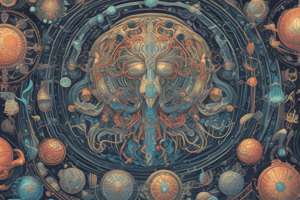Podcast
Questions and Answers
Which factor is NOT mentioned as altering evolutionary pressures on humans?
Which factor is NOT mentioned as altering evolutionary pressures on humans?
- Diet
- Environment
- Technological innovation
- Cultural traditions (correct)
What condition has seen a decreased selective pressure due to modern medical advancements?
What condition has seen a decreased selective pressure due to modern medical advancements?
- Type I diabetes (correct)
- PKU
- Dental Caries
- Myopia
What is a common consequence of untreated dental caries in modern populations?
What is a common consequence of untreated dental caries in modern populations?
- Higher levels of visual acuity
- Increased mortality risk (correct)
- Improved economic status
- Lower incidence of autoimmune disorders
What characteristic of myopia was more important in evolutionary history?
What characteristic of myopia was more important in evolutionary history?
What has allowed alleles that may have been deleterious in the past to persist in modern humans?
What has allowed alleles that may have been deleterious in the past to persist in modern humans?
What role does the immune system play in Type I diabetes?
What role does the immune system play in Type I diabetes?
What is the primary cause of the intellectual impairment associated with untreated PKU?
What is the primary cause of the intellectual impairment associated with untreated PKU?
Which term describes the interaction of genetics and environmental factors in the context of Type I diabetes?
Which term describes the interaction of genetics and environmental factors in the context of Type I diabetes?
Flashcards
Visual Acuity
Visual Acuity
The ability to see clearly at long distances. It was more important in the past to have good visual acuity for survival.
Myopia
Myopia
A condition that makes it difficult to see things clearly at a distance, also known as "nearsightedness". It is now easily corrected with glasses or contacts.
PKU (Phenylketonuria)
PKU (Phenylketonuria)
A condition where the body lacks the enzyme to break down phenylalanine, a type of amino acid. It can be dangerous if built up in the body. A special diet is required.
Type I Diabetes
Type I Diabetes
Signup and view all the flashcards
Reduced Selection
Reduced Selection
Signup and view all the flashcards
Evolution
Evolution
Signup and view all the flashcards
Selection Pressures
Selection Pressures
Signup and view all the flashcards
Autoimmune Response (Type I Diabetes)
Autoimmune Response (Type I Diabetes)
Signup and view all the flashcards
Study Notes
Human Biology in the Modern World: Are We Still Evolving?
- Human biology is still evolving, even in the modern world.
- Evolutionary pressures are changing due to factors such as environment, diet, lifestyle, and disease.
- Technology and medicine have reduced some pressures.
- Humans create comfortable microenvironments, allowing alleles that may have been harmful in the past to be passed down.
Exam 4 Information
- Exam 4 is on December 14, 1-3 PM.
- The exam will be in the Campus Center Auditorium.
- The format and length of the exam will be the same as the previous exam.
- The material covered is from Exam 3 onwards, but is not cumulative.
- The exam will include video content.
- Students should bring photo ID, pen/pencil, and no notes or devices.
- Students should not sit in the balcony.
Are Humans Still Evolving?
- The evolution of humans and their species is still occurring.
- Evolutionary pressures are constantly shifting.
Reduced Selection: Or Just Changes in Selection?
- Certain selection pressures have been eased, especially because of technology and medicine.
- Humans create comfortable microenvironments that allow beneficial alleles to persist that would have been harmful previously.
Myopia
- Myopia is reduced ability to focus at long distances ("nearsightedness").
- Visual acuity was prioritized in the evolutionary past as a survival factor.
- Myopia can be easily corrected using glasses or contacts.
- Selective pressures regarding myopia exist today.
Dental Caries (Cavities)
- Cavities are influenced by environmental and genetic factors.
- Severe periodontal disease and cavities could negatively impact mortality in the past.
- Untreated cavities are currently associated with poor health outcomes; these factors are confounded with socioeconomic status and other factors.
PKU (Phenylketonuria)
- PKU is an inherited metabolic disorder.
- Individuals with PKU lack the enzyme needed to break down phenylalanine.
- High phenylalanine levels can harm the body, necessitating a special diet.
- Without intervention, serious intellectual impairment is common.
- PKU screening in infants is widespread since the 1960s.
Type 1 Diabetes
- Type 1 diabetes, commonly called "juvenile" diabetes, has increased in recent years.
- Reduced selective pressures due to modern medical advances may contribute to the rise.
- Type-1 diabetics didn't typically survive to adulthood in the past.
- Type 1 diabetes is a result of an autoimmune response targeting insulin-producing cells.
- Individuals affected require insulin for survival.
Climate and Evolution: Are We Evolved to Be Adaptable?
- Current discussion on whether humans are adapted to be adaptable to changes in climate.
Stress
- Elevated, chronic stress is linked to poor outcomes.
- Stress impacts cardiovascular health and aging.
- Stress is a significant contributor to health disparities.
Obesity
- Obesity is a form of malnutrition.
- A "thrifty phenotype" or "thrifty genotype" may contribute to obesity (more efficient energy storage).
- Food insecurity contributes to obesity.
- Metabolic diseases are linked to obesity.
Culture and Evolution
- Culture has significantly influenced adaptive pressures.
- Factors like food production, housing, technology, education, and medicine have shaped the trajectory of evolution.
- The question of how these aspects will influence future generations remains open.
Understanding Human Variation
- Humans have low genetic variability.
- Evolutionary forces have historically led to adaptations to local conditions; this is not always guaranteed.
- Race is an ineffective descriptor of biological variation.
- Human biological variation is compounded by cultural and environmental factors.
Studying That Suits You
Use AI to generate personalized quizzes and flashcards to suit your learning preferences.




